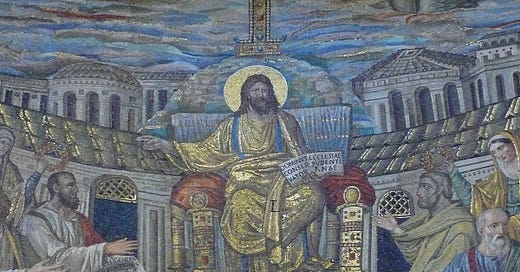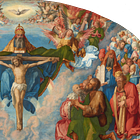Divine faith does not admit 'falsification events' for the Church
Today, so few people have faith. They have Christian opinions, or they consider the Church to be the best vehicle for their prior ideas and prejudices. Such persons are in a precarious position.
It has become common to hear contemporary Catholic writers talking about the current crisis in the Church as if what is at stake is the falsifiability of the Catholic religion.
This betrays a very flawed understanding of Catholic fundamental theology and the nature of divine faith.
In a similar way, some of these people also speak as if the process by which we conclude which is the true Church of Christ is like seeing who has won a tight race. In such an analogy, the Roman Church has won; with the runners up being Byzantine Orthodox, Oriental Orthodoxy, Anglicanism, etc.
Along with this way of speaking comes the implicit (and sometimes explicit) idea that if the winner were to be disqualified (e.g., on grounds of having cheated), then the first runner-up would become the new winner by default.
We saw a recent example of this mentality on social media, with various Catholics listing the top five heretical or schismatic denominations they would embrace, if the Catholic claims were to be falsified.
“Popesplaining” and sins against the Holy Ghost
In the flawed paradigm outlined above, one must be always alive to the possibility of evidence which disproves the claims of the Catholic Church, and be ready to accept such evidence if necessary. The alternative is “intellectual dishonesty” and even rejecting the (supposedly) known truth – a sin against the Holy Ghost.
All this is contrary to what is required by the assent of faith, and completely corrosive to the virtue of faith.
Fundamental theology
These writers exhibit a kind of natural intellectual honesty, but it is misplaced in this context.
The assent of faith is certain and irrevocable.
Fundamental theology demonstrates that the man Jesus of Nazareth was the divine legate, and himself divine and our redeemer. This is established with certainty in a variety of ways, including miracles, the fulfilment of prophecy – as well as by the testimony of history.
From all this and for further reasons, we also know that the society which this God-Man founded has certain properties, including perpetuity, and marks or notes by which she can be known. These notes have been found only in the Roman Church.
In addition, there are other serious arguments by which we know that none of the other claimants can be the true Church. These arguments would not be invalidated if it turned out that Rome had “cheated” and her claims were “falsified”; and as such, none of the “runners-up” would become the winner by default.
We are not Catholics because we think the Catholic Church is “probably” the Church of Christ, or the runner who happened to be “the winner of the race.” Anyone who is thinking in this way is in danger of falling away when troubles come – and what are we living in, except a time of full trouble? Such persons should make a diligent study of fundamental theology at a level which is appropriate to them.
Human vs. Divine Faith
More importantly: Natural reason, enlightened by grace, plays its part in the lead-up to the act of faith; but once one gets to that point, and makes the act of faith, it is no longer possible to talk of “intellectual honesty,” “tight races” and “falsification events”.
For this reason, talking of tight races and falsification events suggests that one is not really assenting to the dogmas of the divine revelation by the virtue of divine faith, on the authority of God revealing and the condition of the Church proposing them to us.
Rather, such talk suggests that one is assenting to such propositions on the basis of what Marin-Sola calls a “human faith,” on the authority of “science” (i.e., theology, exegesis, history), and on the condition of our reason and private judgment being satisfied with what such science proposes.
While this process might direct one to assent to propositions which are both true and divinely revealed, such assent of itself is not an act of faith. As St Thomas Aquinas writes:
“The species of any habit depends on the formal reason of the object, and if this is removed, the species of the habit cannot remain.
“Therefore, whoever does not adhere, as to an infallible and divine rule, to the doctrine of the Church, which proceeds from the First Truth as manifested in the Holy Scriptures, does not have the habit of faith.
“Instead, he holds by another means what pertains to faith, but in a manner other than by faith”.[2]
It is for this reason that, in Newman’s novel Loss and Gain, a Catholic character said that the Anglican protagonist, Reding, had no faith. Reding held to certain truths of revelation because of his own private judgment, rather than for the proper motive. He was someone who “believes himself,” as the same priest says, "and not the external word of God."
As such, his assent was not an act of divine faith at all.
Those who find themselves talking about “falsification events” and “tight races” should take care. It may be that they already have one foot out of the door of the Church.
It may be that they are not assenting to revelation through divine faith at all, which is necessary both to please God and salvation. If this is so, let them ask for the grace of divine faith: no doubt God will hear this prayer.
All this calls to mind the words of Archbishop Lefebvre:
“For I think that many Traditional Catholics enjoy the traditions; they like the old Mass, they like the old sacraments, they like the old teaching of the Church, but they do not really believe in Jesus Christ as the one and only Saviour, God and Creator.”[3]
We cannot let these words apply to us. We should also be frequently praying an Act of Faith as found in any good prayer book, asking the good Lord to increase our faith, and avoiding occasions of danger to the faith (such as bad books, the specious arguments of false sects and false religions, and so on).
PS: If you liked this piece, you’ll find many of the same themes in our essay on Easter and divine faith – take a read and please share this essay with anyone you think might be in need of it.
And this too:
As well as always being ready to give a “reason for our hope” to anyone who asks us, we must also be ready to “strengthen what remains” in our fellow Catholics, marked with the character of baptism as a precious sheep of the Good Shepherd.
[1] Quoted in Nicolau, On Holy Scripture, Sacrae Theologiae Summa IB, Trans. Fr Kenneth Baker, Keep the Faith Press. n.. 116, p 615.
[2] ST, II-II, q. 5, a. 3.
[3] Archbishop Marcel Lefebvre, The Archbishop Speaks – Talks Given by Archbishop Marcel Lefebvre on March 30 and April 18, 1986. Available at: https://isidore.co/misc/Res%20pro%20Deo/Pope%20St.%20Pius%20X%20&%E2%81%84or%20SSPX/The%20Angelus/HTMLs/1186.html






